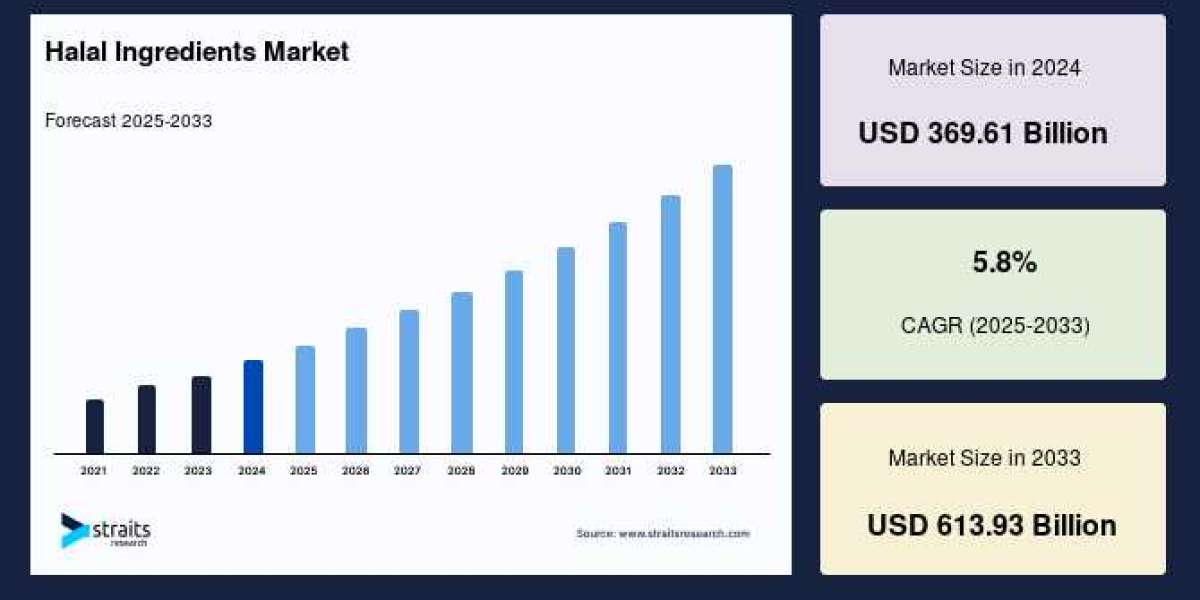The global halal ingredients market size was valued at USD 369.61 billion in 2024 and is projected to grow from USD 391.05 billion in 2025 to reach USD 613.93 billion by 2033 , growing at a CAGR of 5.8% during the forecast period (2025-2033). As the Muslim population expands, one of the key factors driving the market of halal ingredients growth is the increase in demand for halal food and ingredients.
Understanding Halal Ingredients
Halal ingredients are components used in products that comply with Islamic dietary and ethical laws. The term "halal" means "permissible" in Arabic, indicating that the ingredients and the final products conform to Islamic guidelines. These ingredients span various categories food additives, flavorings, enzymes, pharmaceuticals, and personal care elements all undergoing strict certification to ensure compliance with halal principles.
The expanding demand is rooted not only in the rising Muslim population, projected to nearly double by 2060, but also in the global consumer shift toward healthier, safer, and more natural products. Even non-Muslim populations are increasingly embracing halal-certified goods due to their association with quality, sustainability, and cruelty-free production.
Market Dynamics and Growth Drivers
Growing Muslim Population and Global Consumer Base
The largest driving force is the rapidly expanding Muslim demographic worldwide, which fuels demand for halal-compliant products. Countries with predominantly Muslim populations, such as Indonesia, Pakistan, India, and Bangladesh, contribute significantly to this consumption. Asia-Pacific, home to over 60% of the world's Muslims, holds the largest market share and shows steady growth.
Furthermore, the globalization of halal products, propelled by heightened awareness and improved certification infrastructure, means that halal ingredients now enjoy growing acceptance in regions where Muslims are minorities, such as Europe and North America.
Rising Halal Tourism
The growth of Muslim tourism is a pivotal trend shaping the halal ingredients market. Muslim travelers seek destinations and hotels that provide halal food and maintain religious dietary standards. This trend creates new opportunities for hotels, restaurants, and the foodservice industry to expand offerings that use halal-certified ingredients, driving associated supply chain growth.
Demand for Clean, Natural, and Ethical Products
Modern consumers across various demographics are increasingly willing to pay a premium for products that emphasize natural, organic, and cruelty-free attributes. This global trend benefits the halal ingredient market, positioning halal certification as a hallmark of quality and ethical business practices beyond religious adherence.
Innovation and Expansion in Product Applications
The halal ingredients industry extends beyond food to pharmaceuticals, cosmetics, and personal care products. Consumers demand halal-compliant medicines and skincare, prompting manufacturers to expand product lines and invest in halal certification. This multi-sector expansion enhances the overall market potential.
Regional Insights
Asia-Pacific: Market Leader
Asia-Pacific leads the global halal ingredients market due to its large Muslim population and strong cultural adherence to halal dietary laws. Countries like Indonesia, Malaysia, Pakistan, and India are focal points of consumption and production. Malaysia, in particular, is promoting halal as part of sustainable and cruelty-free products, appealing to both Muslim and non-Muslim consumers.
Middle East and Africa: Fastest Growth Region
The Middle East and Africa region is expected to exhibit the fastest market growth. The Muslim population there is projected to increase significantly over the next decade, driving demand for halal-certified goods in food, pharmaceutical, and personal care sectors. Saudi Arabia and the UAE are investing heavily in halal manufacturing infrastructure, aiming to become global halal economy hubs.
Europe: Emerging Market Potential
Though the Muslim population in Europe is smaller relative to Asia and the Middle East, its market share is expanding steadily. Countries like Germany, France, and the UK, with significant Muslim communities, are witnessing rising awareness and demand for halal products. Germany, in particular, is emerging as a key market within Europe, benefiting from trends towards cruelty-free and ethical consumption.
North America: Moderate Growth
North America's halal ingredients market is growing moderately, propelled by increasing Muslim populations and greater interest in ethical product sourcing. The United States, for instance, is experiencing rising halal product demand from both Muslim and non-Muslim consumers seeking high-quality, clean-label options.
Latin America: Slow but Steady Progress
Latin America’s growth in halal ingredients faces challenges due to cultural and educational barriers, but increasing Muslim demographics in countries like Brazil are slowly opening markets. Awareness campaigns and certification efforts are expected to gradually improve acceptance.
Market Segmentation
By Application: Food Industry Dominance
The food industry accounts for the largest share of the halal ingredients market. This includes a wide array of products from raw inputs to processed foods, beverages, and ready-to-eat meals. The rising consumption of halal-certified packaged foods, sauces, marinades, and flavor enhancers fuels this dominance.
Pharmaceuticals and Cosmetics: Emerging Segments
Growing consumer demand for halal compliance in pharmaceuticals and personal care items creates new avenues for ingredient producers. Halal-certified medicines and cosmetics cater to health-conscious and religiously observant consumers, expanding halal ingredient applications and encouraging innovation.
Challenges and Opportunities
While growth prospects are strong, the halal ingredients market faces challenges including limited consumer awareness in non-Muslim majority regions and the complexity of halal certification processes. Education and marketing campaigns will be essential to overcome these barriers and boost acceptance globally.
Conversely, the halal ingredients market represents significant business opportunities for manufacturers, distributors, and certification bodies due to the rising demand for ethically sourced, quality-assured products. Investments in sustainable practices and supply chain transparency will further enhance market expansion.
Conclusion
The global halal ingredients market is set for substantial growth driven by demographic trends, evolving consumer preferences, and expanding applications beyond food into pharmaceuticals and cosmetics. As halal certification becomes synonymous with ethical, high-quality production, the market appeal broadens well beyond its traditional base, promising dynamic growth and diversified opportunities over the coming decade.







